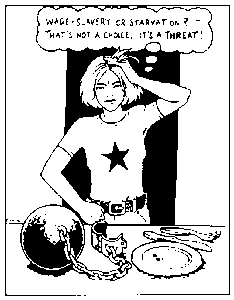I have always loved squirrels. Since I was a kid, I’ve been watching them zip up trees, hang beneath branches and on a rare occasion, fly through the air and land lightly on a limb. They are industrious little bastards. They gather nuts and seeds, chowing down on some and stuffing the rest in their cheeks until they can find places to hide their bounty for a rainy or snowy day. Something else about squirrels, they have a lot of fun. Even though they work their tales off, they take time to play, chasing each other around and enjoying labor and life. 
My love of nature is part of what has drawn me into fight against catastrophic climate change. After all, someone must defend the rodents. My love for the working class is what has made me see that any movement for a sustainable world requires an understanding of the primacy of sustainable labor. We need time to play, to enjoy labor and life, to work in an interconnected way with our environment and each other, to understand the complexity and simplicity of our needs and construct an economy that sustains this kind of life. Humans may be powered by electrical impulses, but we are not microchips snapped into the motherboard of some vast high tech economic fantasy. The meaning of work is not to upload revenue to billionaire technocrats or to fuel the engine of “unlimited economic growth.” I’d rather be a squirrel.
Some of you may me thinking, “He may not be a squirrel, but he sure is squirrely.” Hey, I can dig it. It’s the road I’m on. In 1980’s when I was in my twenties, I was a displaced worker. Traditional working class jobs were declining so I went to school. It took me a while, but by the early 1990’s I had managed to get myself an MA in English and become a Marxist. I had dreams of joining the intellectual elite or writing the Great American Proletarian Novel, but I was also tired of being broke and figured, “There are already enough Marxists in the universities, maybe I should try organizing workers.” That’s what led me into the union movement.
Protecting the environment has always been important to me, but I wasn’t actively trying to defend it. Then I wrote a story about the development of sustainable local economies in New England for this outdoor type website and read Bill Mckibben’s book Deep Economy. I began to have different view of how the economy of a sustainable society could be organized. I discovered that keeping money local was a good thing. Mckibben didn’t talk much about labor or work conditions in his book, but I still saw the value in going local. I joined a CSA (Community Supported Agriculture) and tried to spend more money with local business. Many of the local business folks I have met over the years have looked, acted and had the attitude of Chris Christie, so I didn’t probe that deeply into their labor practices, but I did begin to ponder what sustainable labor would look like. Still pondering, but here are some ideas. I’d like to know what you think as well.
- Sustainable labor must put the needs, health and wellbeing of workers and the planet a head of profits and “unlimited economic growth.”
- Green technology doesn’t mean a sustainable economy all by it self. The technology needs to create and promote sustainable labor too. The assembly line, whether it is building Hummers or solar panels, is not the model that we need. We need technology that does not promote alienation from the work. It must include within it the idea of connecting people to the product or service they are producing, of building cooperative and collaborative relations and squash the idea of human beings as resources. We are not an expense or a raw material. We are the creators of value.
- Child care, cleaning living quarters, growing or buying and preparing food for a family, caring for family members who are ill, are as integral a part of the production process as using a tool to change raw material into an object that can be sold. The sexist division of labor must be obliterated.
I am interested in what you think sustainable labor is or what it could be. That’s why I’ve decided to create a website SustainableLabor.com. I want to start a conversation among working people about how work would be in a sustainable society. I’m looking for people to share ideas, their stories and the ramblings of their imagination. As Einstein wrote, “Imagination is more important than knowledge. For knowledge is limited, whereas imagination embraces the entire world, stimulating progress, giving birth to evolution.”
If you’re into not this idea, then I urge you to do whatever you can to work toward moving us toward the paradigm change that can help us build a sustainable economy. Join a CSA, check out 350.org, plant a garden, talk to your friends and neighbors. We need a monumental change in consciousness to make this happen. Any action that pushes us toward that change matters. My favorite spiritual dude and bad assed Buddhist philosopher and activist Thich Nhat Hanh believes, “Mindfullness must be engaged. Once there is seeing, there must be acting. Otherwise what’s the use of seeing.”



